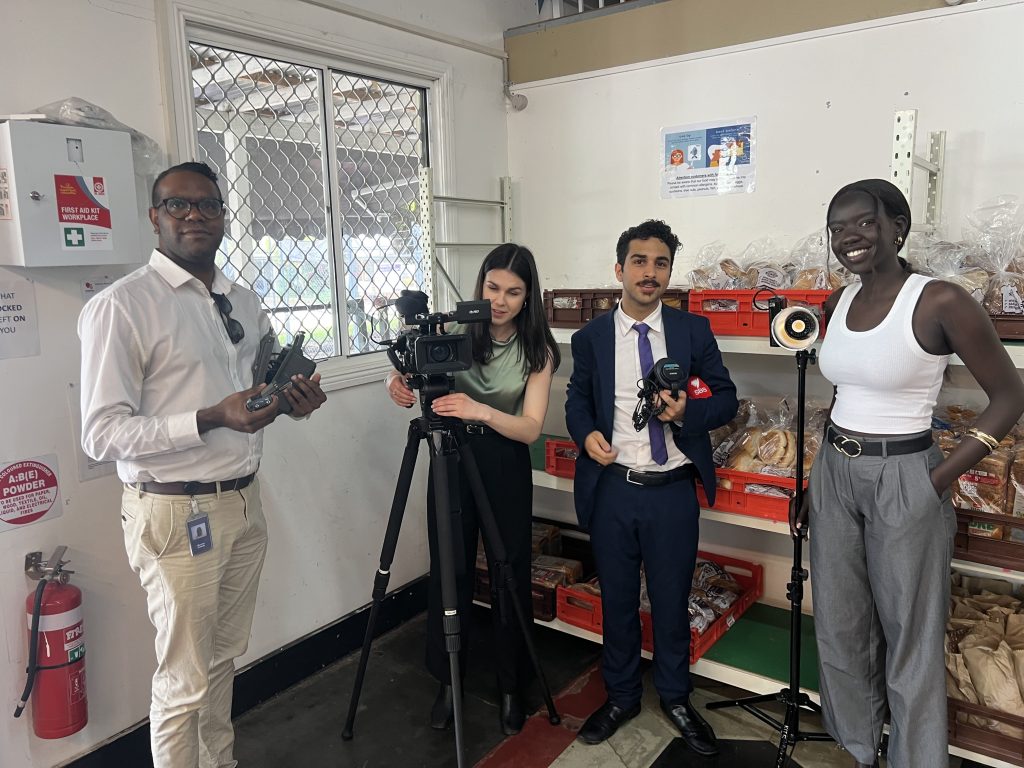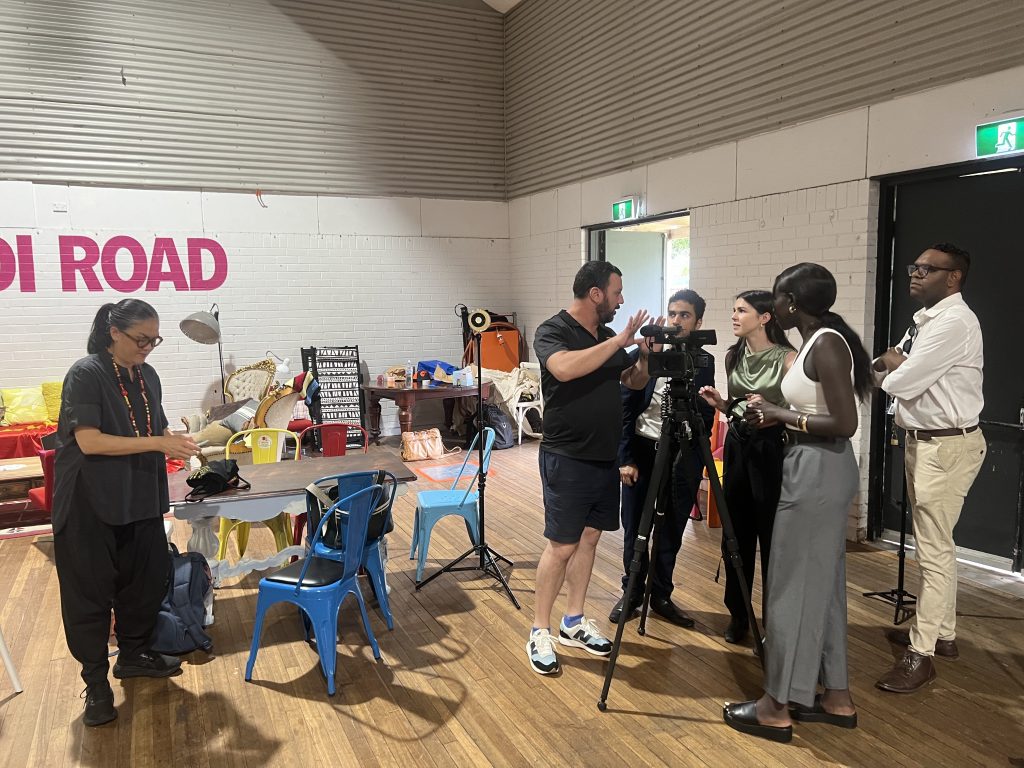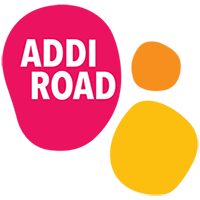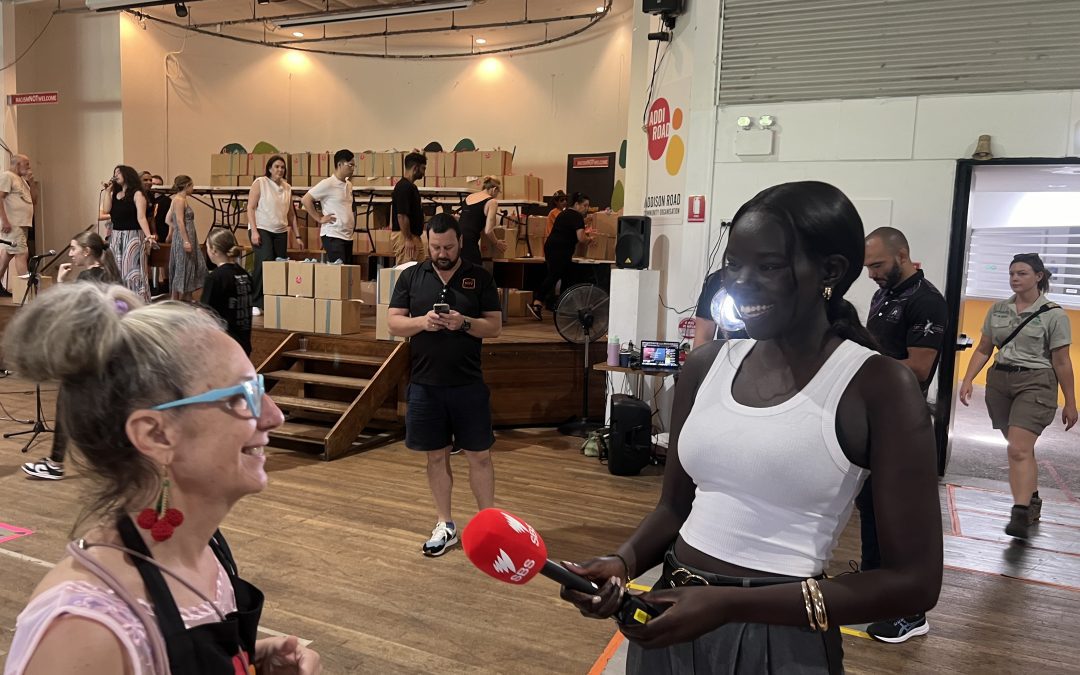SBS News are here to film Addi Road’s work at our Food Pantry in Marrickville as well as the hive activity underway during our annual Hampers of Hope push for the holiday season.
It’s the week before Christmas and we are rocketing towards our goal of 2000 hampers, each of them full of food staples, essentials, treats and small gifts that might make this time of year a little happier for those in need.
In the meanwhile, it’s business as usual at both our Addi Road Food Pantry outlets (we have a sister shop in Camperdown as well as our main base inside the community centre at Marrickville). During 2023 we have been feeding 8,500 people a week on average. There’s no let-up as the holidays begin for some – and intensify the economic and food insecurity pressures on others.
The young team of SBS journalists visiting Addi Road turn out to be cadets having their Video Journalism training week. Almost inevitably, they seem sharp, smart, and very on it. The story they are doing turns out to have been “our pitch”, they say, part of a concern for “the way the cost of living makes it unaffordable for people to keep up with a healthy diet”. People aren’t just battling to survive; the journalists have heard the fight is affecting everything from family well-being to mental health and people’s capacity eat not only regularly but decently.
As they set up their camera and look over their prepared questions, Achol Arok goes on to explain their story, thus far, “is only the top-line idea”. They’re keen to find out how food insecurity might be intensifying; and how it might be even challenging stereotypes, the ways we’ve got too used to thinking when we picture the demographics of food insecurity.
In the last few years food has certainly become a critical and precise thermometer for inequality and struggle. Places like Addi Road allow a reading on what the hell is going on – statistically, yes; and at a deeper, more human level. A story within a story within a story is evident. And needed.

SBS News team Marcellus Enalanga, Sophie Bennett, Youssef Saudie and Achol Arok. Addi Road Food Pantry, 16 Dec 2023. Photo Mark Mordue.
Working with Achol Arok are Sophie Bennett, Youssef Saudie, and Marcellus Enalanga. Both Achol and Sophie studied at La Trobe in Melbourne; Youssef at UTS; and Marcellus in Alice Springs and Darwin, his background “more in film” than journalism. They swap roles from camera operating to asking questions and back-checking details, from acting as the story producer to being a director to engaging as interviewers. Each of them under the watchful eye of Zoran Gajic, a long-time journalist, producer and camera operator training them as VJs (video journalists).
All of them are thankful for the way SBS continues the cadetship process and agree that an over-emphasis on tertiary pathways can make it difficult to ensure kids from poorer backgrounds and localities get a real chance of a career in the media. “It’s very competitive,” Achol explains. “You still don’t see many people who look like me in a news room.” Achol identifies this absence of diversity in the media as something that goes beyond simplistic identifiers around culture and ethnicity into complexities that involve what she calls “the greater issue of privilege and class”.
It’s this kind of structural problem in the media that tends to narrow the vision of those speaking from – and controlling – its content and narratives. You can sense in Achol, Sophie, Youssef and Marcellus the makings of whole new wave of energy, a generational commitment to tilting things for the better. Their interest in food relief and social inequality is just one of a hundred ideas they want to explore.
During their SBS interview inside the Food Pantry with Addi Road CEO Rosanna Barbero the four budding VJs dig into the details food insecurity. Rosanna explains how “if you can’t pay your rent, you lose your home; if you can’t pay your mortgage, you lose your home; if you can’t pay your utilities, the power or the gas is turned off; if you can’t keep up with vehicle payments, you will lose your car. But you don’t eat, if you have no food, no one cares but you. So on your weekly budget food is what you give up first.”
It’s not some distant social justice problem for the VJs. Being on cadetship wages, the journalists themselves admit they can relate to this stress and the type of thinking that a very tight budget demands in Sydney. They’re not just reporting on an issue; they’re feeling some of its intensity in their own lives.

SBS interview CEO Rosanna Barbero inside Addi Road Food Pantry Marrickville. Photo Mark Mordue.
As their mentor for the day, Zoran Gajic chips in a very specific question for Rosanna about how the demographics of food relief are indeed changing in the wake of so many who are feeling the cost-of-living crisis. She responds by saying that demand has increased by 30% this year via our Addi Road Food Pantry services. “It’s staggering.”
The need no longer constitutes a somewhat generic picture of unemployed, students, boarding house residents, low-income earners and single-parent families battling; more and more, we are seeing well-dressed people with nice cars and nice houses unable to keep up. They are all looking to save money and get through their problems. This is the new and expanding nature of what Rosanna calls “the working poor”.
It’s ironic that hardly anyone in this television production crew is oblivious to the nature of such stresses, directly or indirectly. Off camera we discuss people suffering and on the edge despite the veneer of success that might seem to be there. It’s agreed something is seriously wrong ‘out there’. It’s a key reason for why the young journalists have come up with the story idea and focussed their attention on Addi Road as a case study to test if their own anecdotal experiences and research are pointing the right way.
Rosanna explains to SBS the more general operations of Addi Road Food Pantry as a low-cost grocery store. Along with the support of donors and partners, we rescue tonnes of food every week to stop it from going into landfill and creating greenhouse gases. A $5 shop (with many bargains on the shelves and in the fridges) yielding around four times that value is further supplemented by free fruit and vegetables and bread once our customers purchase whatever they like.
“So the principle here is to give people autonomy?” asks Youssef.
Correct. People buy whatever they like – and no matter how they choose to spend their money we add in staples like bread and fruit and vegetables for free to make sure everyone is being given something nutritious without imposing any limits or directives on what they take away by choice.
“And if you cannot pay, you can still shop here,” Rosanna emphasises. “We [Addi Road] also don’t ask people to offer proof that they are poor or any evidence of why they might need something or shop here.”
There’s an understanding too that anyone who shops at our Food Pantry is also helping the environment, an undercurrent of getting beyond a charity service-mentality that is just responding to need. Addi Road encourages an interchange where we can express being grateful to our customers for helping us to help the environment and reduce waste. Those who come to Addi Road Food Pantry are very aware of this.
It’s an operating procedure that connects to related issues like mental health and enhancing people’s self-respect , their sense of empowerment and volition in the world, as much as simply getting them some decent food on a budget.
“We do try to help people be more frugal but we don’t treat them like they have to be destitute. We work with the community on how to cook meals and share recipes. We’re also providing prepared cooked meals to people in boarding houses and single-parent households as well as running a school cook-up program. We are not unrealistic about how time poor people are as well as what they can financially manage. If you’re in a single parent household and your 12-year-old can’t really cook and you’re home after a long shift or holding down two casual jobs to make ends meet, a readymade nutritional meals becomes very important.”
No one claims that any of this is easy, of course. Over time Addi Road has grown to meet community needs by also listening to people and understanding how culturally-appropriate food is very important to the success of our food justice program.

Chef Kylie Kwong prepares to be interviewed by SBS Video Journalists. Zoran Gajic instructs his young team. Photo Mark Mordue.
Chef Kylie Kwong has been tremendously helpful in that process, alerting us during the pandemic to how much more effectively and pleasingly we could curate our emergency hamper contents to be more effective for different cultural groups. Kylie is at work today volunteering once again at Addi Road for our holiday season Hampers of Hope week. When SBS move across from the Food Pantry to Gumbramorra Hall to document the Hampers of Hope event they nab Kylie for a quick interview too.
Kylie describes Addi Road to the journalists as “a really good place, a really special place.” She also emphasises how “Addi Road looks after vulnerable people every day of the year. I’ve been coming here since pandemic , the hard lockdown of 2021. I am a restauranteur. Everything was closed. I felt depressed, down… wondering what I could do that would have some value. I saw what was happening on Addi Road socials and I wanted to be a part of that community. Once I came here I fell in love with place. Addi Road brings out best in all of us.”
She jokes about the importance of food in her life, its role as part of her extended family and their gatherings. Food as not just a necessity, but an expression of what family and connection is. Absence of food literally eats away at those connections, destroys family and community bonds. “So being Chinese, the thought of going hungry just horrifies me.”
Addi Road’s Rosanna Barbero affirms Kylie Kwong’s thinking in a second interview with the journalists who have opted to spend their entire morning at the community centre. “When we invite people to break bread with us we are telling our stories to one another,” Rosanna says. “Providing culturally appropriate food is another way of us saying we hear you, we see you, we understand. Everybody comes together here. Whatever your ethnicity, class, sexuality, culture, religion, age. All are welcome.”
“Our Food Pantry is a place – and it’s a moment too – where people can connect, where you can come if you’re feeling isolated or lonely. There’s a safe sense of community here. You can’t push that or fake it; it has to happen organically. It has to come from the community. We offer other wraparound services too as part of our food justice programs… outside the front of the Food Pantry people can get free medical help from Street Side Medics on our Wednesday Nights Lights evenings, as well as free legal advice, clothes, toys, free haircuts.”
The ideas and the list of activities and their impact start to get quite long. Rosanna Barbero searches for an easy way to sum it all up for the SBS VJs. They ask for a simple line. Just to help with putting their story together. Rosanna thinks for a moment then says, “the Addi Road Food Pantry is a communication of love and solidarity”. She stops again, worried. “Does that sound too corny to say it like that?” No, the journalists say, it does not sound corny at all.


